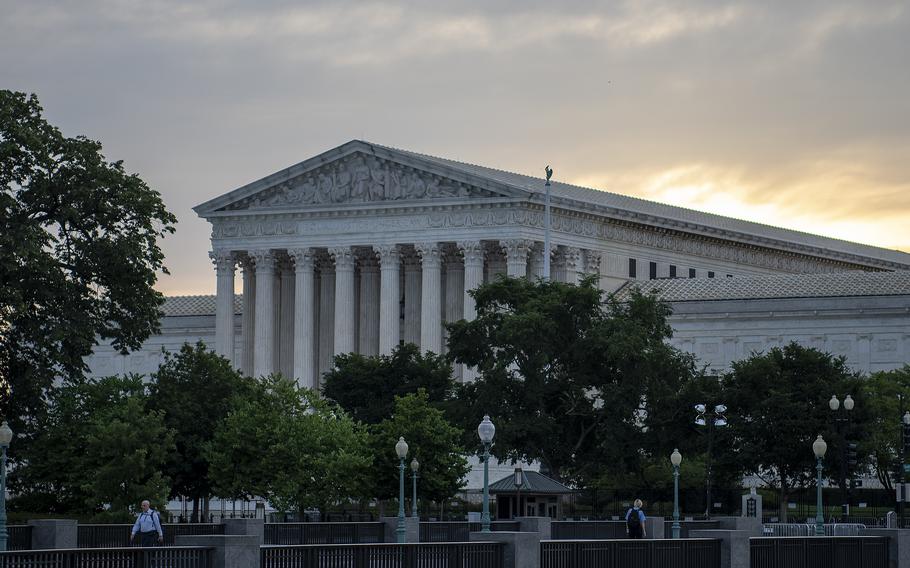
The Supreme Court building as seen on July 6, 2022. (Carlos Bongioanni/Stars and Stripes)
Nineteen retired generals, admirals and former top civilian defense officials have filed a brief with the U.S. Supreme Court opposing former President Donald Trump’s bid for immunity from prosecution.
“We risk jeopardizing America’s standing as a guardian of democracy in the world and further feeding the spread of authoritarianism, thereby threatening the national security of the United States and democracies around the world,” the group wrote.
The 38-page amicus brief includes officials from Democratic and Republican administrations dating back to former President John F. Kennedy, as well as four-star generals from the Army, Air Force and Marines, and Navy and Coast Guard admirals.
The signatories to the brief include Ray Mabus, secretary of the Navy from 2009 to 2017, and retired Air Force Gen. Michael Hayden, who also served as director of the CIA. The group also includes retired Army Gens. George Casey and Peter Chiarelli, retired Air Force Gens. John Jumper, Craig McKinley and Charles Wald, retired Marine Corps Gens. Carlton Fulford, Charles Krulak and Robert Magnus, retired Navy Adms. Steve Abbot, Samuel Jones Locklear, John Nathman, Bill Owens and Scott Swift, and retired Coast Guard Adm. Thad Allen.
Top former civilian defense officials in addition to Mabus are former Army Secretary Louis Caldera, former Air Force Secretary Deborah Lee James, and former Navy Secretary Sean O’Keefe.
The court is scheduled to hear arguments April 25 about the question of Trump’s immunity from facing charges for his role in the alleged criminal conspiracy to block the results of the 2020 election that he lost to President Joe Biden.
Trump is not charged in that case. But he is charged in an election interference case in Georgia that could be impacted by the federal action. Trump is also charged in another federal case accusing him of election interference that has been held up until the case on April 25 is resolved.
The amicus brief — known as a “friend of the court” brief — from the top defense officials argues that without rapid action to negate the claims of immunity, the cases could become moot since they would not be heard prior to the November presidential election. Trump is the expected Republican nominee against Biden. If elected, Trump could use his presidential authority in a bid to pardon himself from prosecution.
Trump’s lawyers in February argued at the Supreme Court that the possibility of facing prosecution for actions while in office would “incapacitate every future president with de facto blackmail and extortion while in office and condemn him to years of post-office trauma at the hands of political opponents.”
The former military leaders said allowing immunity would undermine confidence in the role of the military at home and abroad, and relations with allies and potential enemies.
“Presidential immunity from criminal prosecution would threaten the military’s role in American society, our nation’s constitutional order, and our national security,” the former defense leaders wrote. “It also would have profoundly negative effects on military service members, who answer to the orders of the president as commander in chief.”
The group argued immunity would place commanders and their troops in a vise between obeying their oath to the Constitution and orders from the president.
“The president could, with impunity, direct his national security appointees to, in turn, direct members of the military to execute plainly unlawful orders, placing those in the chain of command in an untenable position and irreparably harming the trust fundamental to civil-military relations,” they wrote.